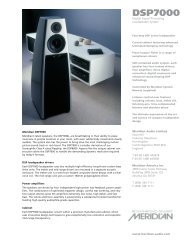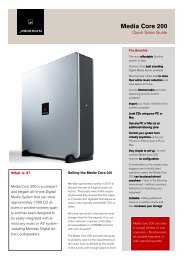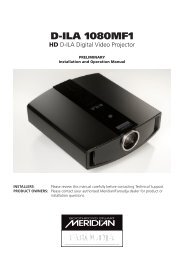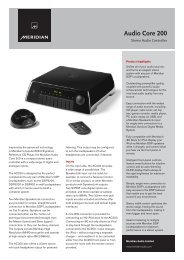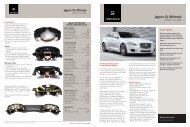Sooloos Collections: Advanced Guide - Meridian Audio
Sooloos Collections: Advanced Guide - Meridian Audio
Sooloos Collections: Advanced Guide - Meridian Audio
You also want an ePaper? Increase the reach of your titles
YUMPU automatically turns print PDFs into web optimized ePapers that Google loves.
Some Finer Points of Focus<br />
Focus is a very powerful function and this sectionn delves deeper to help you y get the most out of it. As we<br />
described on<br />
page 16 the Focus screen has eightt major sections (tabs): Album A info, Genres, Composers,<br />
Credits, Labels, Tags, Moods and * (Forensics).<br />
Album Info<br />
The Album Info tab groups four different types of information:<br />
• Most Played (which looks at play count – a dynamic counter based on use). 8<br />
• Date-related: Last played, Added and Release Date.<br />
• Quality.<br />
• Ratings, Picks and Skips.<br />
Focus Logic<br />
If we focus on any single<br />
criterion then the operation is fairly<br />
self-evident. For example, we can make a single<br />
focus on albums:<br />
• recorded in ‘High Resolution’ or ‘Content added in the last 3 Months’ (Albumm Detail)<br />
• containing music of the Romantic Era (Genre/Genre)<br />
• featuring an instrument, e.g. ‘Viola’ (Genre/Instrumentation)<br />
• containing a particular Form, e.g. ‘Sonata’ (Genre/Form)<br />
• with<br />
works composed by Beethoven (Composer)<br />
• featuring a particular artist , conductor, accompanist, e.g. Bryn Terfel, T Claudio Abbado, etc(Credits)<br />
• released by, e.g. ECM (Label)<br />
• with<br />
a specific user tag.<br />
Every criterion may also<br />
be negated, so the above examples<br />
could be ‘exclude’ rather than include. Useful<br />
for isolating<br />
hard-to identify groups, , such as ‘remind me what I have hadn’t played in a year’.<br />
Include/Exclude Must/May<br />
have<br />
<strong>Sooloos</strong> <strong>Collections</strong>: <strong>Advanced</strong> <strong>Guide</strong><br />
So, what happens when<br />
we focus on<br />
more than one criterion? The way it works depends on what they are,<br />
but the system can form<br />
extremely tight focuses, e.g. ‘show me albums containing works composed by<br />
Dvorak, of form string quartet, that I haven’t played for 3 months but ignore the ECMM label’.<br />
We have tried to make the focus operation intuitive but there are somee subtleties worth grasping. Focus<br />
uses two logic operations in combining two or more criteria:<br />
• Logical OR: if we<br />
combine two criteria inn this was we<br />
mean we want w to see any containing A or B.<br />
For example if we Focus on two composers (such as Bach and Copland) the number in the result willl<br />
be greater than focussing on<br />
either individually. OR logic expands the answer. In simple terms we<br />
are looking for items that may include A or B.<br />
• Logical AND: This logic is used to show items that must contain all a criteria. Soo if we Focus on Bach<br />
and<br />
Cantata the<br />
resulting number will normally be smaller than taking either criterion individually.<br />
AND<br />
logic narrows the answer. In simplee terms we are looking for items thatt must include A and B.<br />
8 You may find that the number in focuss is wrong. Forr example if you ask for thee 100 most-played albums the t number<br />
could be higher if some albums are included in sets.<br />
Page | 40




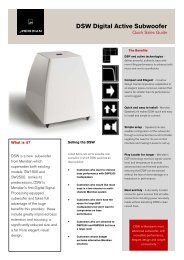
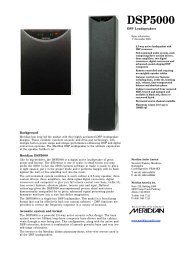
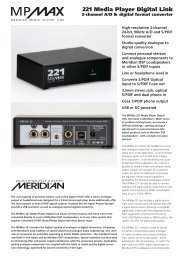
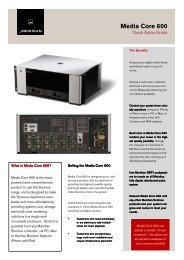
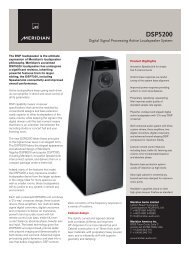
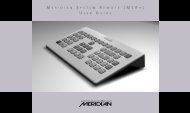
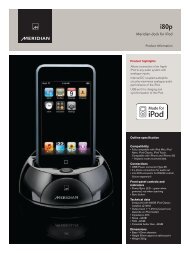
![The Sound of Minute Repeaters Bob Stuart - meridian-audio[.info]](https://img.yumpu.com/27188010/1/184x260/the-sound-of-minute-repeaters-bob-stuart-meridian-audioinfo.jpg?quality=85)
